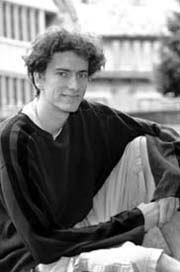Dautremont-Smith snags Truman Scholarship

“Winning this award is exciting as well as overwhelming,” says Dautremont-Smith, the College’s seventh Truman scholar in the last 12 years. “It opens many new opportunities for the future as I seek to develop and change public policy to benefit social justice and the environment.”
The Harry S. Truman Foundation awarded Dautremont-Smith $3,000 for his senior year at Lewis & Clark and an additional $27,000 for graduate studies.
After graduating from Lewis & Clark, Dautremont-Smith intends to enroll in a joint-degree program with the Fletcher School of Law and Diplomacy and the Department of Urban and Environmental Policy and Planning at Tufts university. Upon completion of the three-year program, students earn master’s degrees both in urban and environmental policy and in law and diplomacy.
“Learning how to raise quality of life and standard of living without degrading the environment is the most important challenge facing society,” says Dautremont-Smith. “This program will help me develop tools to promote sustainable development and address international environmental issues, such as transboundary air and water pollution, climate change, deforestation, species loss, soil degradation, marine pollution, and chemical contamination.”
Before he heads off to Tufts, Dautremont-Smith has some unfinished business—completing his push to make Lewis & Clark the first college to meet the Kyoto Protocol, which calls for the United States to reduce greenhouse gas emissions by 7 percent below 1990 levels sometime between the years 2008 and 2012.
He and Eban Goodstein, associate professor of economics, conducted a greenhouse gas inventory of the College and organized a conference on climate science and greenhouse gases at Lewis & Clark in February. The event attracted student-faculty research teams from 25 campuses nationwide who are engaged in measuring and reducing greenhouse gas emissions at their institutions.
“I felt that doing an inventory alone was not really useful unless I actually did something to reduce emissions and stem global warming,” says Dautremont-Smith.
Working with student government, he proposed a $10-per-student fee increase, which 83 percent of voting students approved last year. The increase would have raised $17,000 needed to buy environmental offsets, a temporary measure to bring the College into compliance until alternate methods of reducing greenhouse gas emissions emerge. His proposal was derailed by a conflict with College policy, but Dautremont-Smith plans to regroup and achieve his goal in his upcoming senior year.
True to his commitment to action, Dautremont-Smith traveled to johannesburg, South Africa, with Greenpeace in August to assist with international negotiations at the U.N.’s World Summit on Sustainable Development.
—by Pattie Pace
More L&C Magazine Stories
Lewis & Clark Magazine is located in McAfee on the Undergraduate Campus.
MSC: 19
email magazine@lclark.edu
voice 503-768-7970
fax 503-768-7969
The L&C Magazine staff welcomes letters and emails from readers about topics covered in the magazine. Correspondence must include your name and location and may be edited.
Lewis & Clark Magazine
Lewis & Clark
615 S. Palatine Hill Road MSC 19
Portland OR 97219

